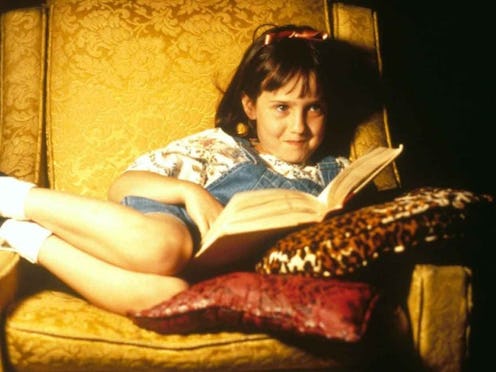Entertainment
'Matilda' Is The Most Progressive '90s Kids Film

There's no doubt in any millennial's mind that Matilda is one of the greatest movies of the '90s. It is one of those pivotal films that came out at just the right time for many of us growing up in the decade. That's not to say that just because it was a kids movie it wasn't dark: Watching it as a child, I was troubled by Trunchbull, and got really worried for Matilda's safety at certain points. But, it was totally balanced out by the boatload of positive moments (pancake-making, telekinetic dance parties, lighthearted moments of karmic revenge, etc.), all of which served as the bedrock for making Matilda such a seminal film. These positive moments (some of which I am going to remind you of in a moment) are tied together by one universal truth: Matilda is the quintessential progressive, feminist movie.
That's right: tere's not one wasted second of celluloid when it comes to Matilda, and it's all in service of a story which empowers all women who watch it. Even now, 20 years after having seen it for the first time, I find myself in total awe of the magic of Matilda.
What exactly makes this film such a seminal one for feminists across the land, though? The reasons might surprise you.
1) The Protagonist Is A Young Girl
There's obviously no mistaking who the central character in this story is. What makes Matilda most immediately different from the others is her age, as well as the level of character development and personal agency she is given.
2) There Are No Central Love Stories
What a sweet relief it is to have a film totally devoid of a love interest. We certainly never needed Matilda to fall in love with a boy, but it's also a surprisingly nice twist that Miss Honey is not given one either.
3) It Passes The Bechdel Test With Flying Colors
It may come as not surprise that Matilda passes the Bechdel Test; but it might be a surprise that it actually earns the pass before it even hits the 10-minute mark. Any conversation between Matilda and Zinnia, Miss Honey, Trunchbull, or Lavender features no chat about guys (luckily), and that means we get to enjoy the film a little bit more.
4) Friendship Is Very Important
Friendship between certain women in Matilda is a high priority. Matilda and Lavender's friendship is central to the story, but the girls are also able to be good friends with the rest of their class. There is little in the way of exclusivity and that's a really, really good thing.
5) Lavender Is A Person Of Color Without Being Reduced To A Stereotype
Lavender was literally one of the cutest BFFs a girl could ask for. She was sweet, opinionated, brave, and never reduced to a stereotype related to her race. Long live Lavender!
6) Single Motherhood Is A Viable And Positive Option
In the final sequence, we get to watch Miss Honey sink into her role as a mother so completely. Better still, she's shown to be a capable and loving mother — not that there was every a doubt beforehand that she would be anything other than a great mom.
7) Knowledge And Education Are Prioritized
Isn't it crazy what can happen when there are no love interests in a film? I'd wager the emphasis on education and the knowledge that can be gained (e.g. Matilda's love of literature) is about to be shown so much because there is no screen time devoted to her chasing boys.
8) Women Regularly Help Each Other
Despite Matilda's age, her readiness and ability to help Miss Honey escape the clutches of Trunchbull is so vital from the feminist perspective. While Miss Honey is a capable adult in her own right, the boost she receives from Matilda is an cinematic example of the good that comes from sisterhood.
9) Sexism Is Addressed Head-On
Danny DeVito may provide a bit of comic relief as well as the narration in Matilda, but as her father, he's a total scoundrel. His dressing down of Matilda and her own pursuit of an education at such a young age comes back to bite him in the butt tenfold. There's no way to keep this girl down.
10) Deals With Female-On-Female Domestic Abuse, And Results In A Hopeful Outcome
The relationship between Trunchbull and Miss Honey is a dark reminder of how women can sometimes relate to each other. Matilda's ability to channel her telekinesis to defy Trunchbull and eliminate her (without hurting her) is a positive answer to a very dark problem.
11) Differences Between Women Are Not Bad
For the women who aren't necessarily evil (like Trunchbull), there's no diminishing of another woman just because of her differences. In fact, they were welcomed and accepted which is totally refreshing to see in a children's film.
All this talk about the empowering aspects of Matilda has me ready to rewatch it. There's no doubting that this film was one of the greatest in the '90s; being able to appreciate the fact that it's also a solidly feminist film just makes Matilda better than ever.
Images: Tristar Pictures; Giphy (10)